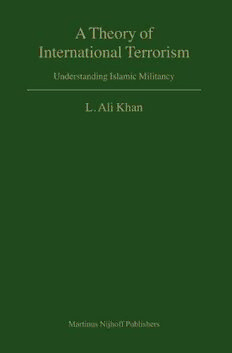
A Theory of International Terrorism: Understanding Islamic Militancy (Developments in International Law) PDF
388 Pages·2006·1.104 MB·English
Most books are stored in the elastic cloud where traffic is expensive. For this reason, we have a limit on daily download.
Preview A Theory of International Terrorism: Understanding Islamic Militancy (Developments in International Law)
Description:
"A Theory of International Terrorism" studies Islamic militancy in the geopolitical contexts of Chechnya, Kashmir, Palestine, and the September 11 attacks on the United States. These contexts have shaped a global ontology of Islamic terrorism, which asserts that puritan Islam is inherently violent and Muslim militants are addicted to carnage. This ontology is significantly changing international law. It defends the preemptive war on terror and disregards civil liberties, prescribing extra-judicial killings, torture, renditions, indefinite detentions, and numerous other human rights violations. These normative shifts are considered inevitable to suppress Muslim militants. Questioning these shifts, the book argues that the policy of no negotiations with Muslim militants is contrary to the UN Charter. It also argues that terrorism cannot be eradicated unless the nation-state evolves into the Free State, a concept developed in "The Extinction of Nation-States" (1996) and "A Theory of Universal Democracy" (2003). Universities, governments, and international organizations will find this book a source of valuable information.
See more
The list of books you might like
Most books are stored in the elastic cloud where traffic is expensive. For this reason, we have a limit on daily download.
